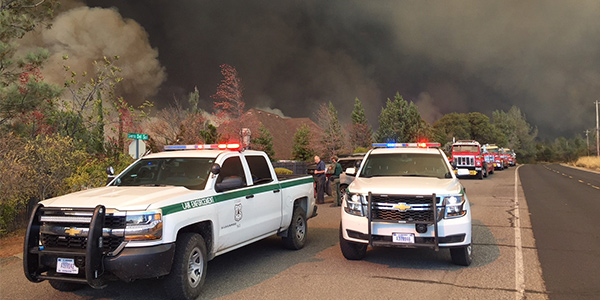Bankruptcy attorneys representing Pacific Gas and Electric summed up their case Monday, telling U.S. Bankruptcy Court Judge Dennis Montali that the utility’s reorganization plan is the best possible outcome for wildfire victims and ratepayers.
PG&E lead attorney Stephen Karotkin said rejecting the utility’s Chapter 11 reorganization plan, as some fire victims and their lawyers have urged, would lead to “total chaos” and delay compensation for years. None of the objecting parties had presented sufficient evidence to defeat the plan, he argued.
“Confirmation is the only path here,” Karotkin told the judge.
There are approximately 80,000 victims waiting to be compensated for the death of family members, and the loss of homes and businesses, in fires ignited by PG&E equipment in 2015, 2017 and 2018.
Montali now must decide the case. “The ball’s in my court to do what’s next,” he said.
The judge indicated he will try to issue at least a brief order approving or denying the proposal by the end of the week.
“June 30 lurks out there,” Montali said, referring to the deadline for PG&E to exit bankruptcy to participate in a $21 billion state wildfire insurance fund under last year’s Assembly Bill 1054.
Montali thanked the lawyers and participants for their “enormous effort” over the past 16 months. PG&E filed for bankruptcy on Jan. 29, 2019, facing what it said were $30 billion in wildfire liabilities. Its negotiated settlements with fire victims, insurance companies, local governments and others total $25.5 billion.
Monday’s hearing capped nearly two weeks of proceedings at the end of the case in which dozens of lawyers and self-represented fire victims spoke for and against the plan. (See Lawyers Argue PG&E Bankruptcy Plan.)
Victims’ Shares Could be Locked up
Last-minute controversies consumed much of the court’s time on Friday and Monday.
Attorney Robert Julian, representing the case’s official Tort Claimants Committee (TCC) for fire victims, told Montali for the first time Friday that PG&E and the TCC were having a dispute about when fire victims would become eligible to sell the $6.75 billion in stock with which PG&E is planning to fund half of a $13.5 billion victims’ trust.
Fire victims will own approximately 20% of PG&E under their settlement agreement with the utility.
Without specific wording in the 2,000-page bankruptcy plan, however, victims could be prevented from selling their newly issued stock for five years under federal regulations, Julian said. Hedge funds that already hold billions of dollars in PG&E equity could sell their shares immediately, he said. Institutional investors and fire victims need to be on equal footing, Julian argued.
Many fire victims have expressed concern that the stock could sink in value if PG&E starts more wildfires or becomes financially unstable from its heavy debt load after leaving bankruptcy.
The discussion continued Monday morning, when Julian and Karotkin said the matter was being mediated by retired bankruptcy Judge Randall Newsome, who has helped resolve major disputes in the case. Karotkin said he was hopeful the disagreement could be settled soon.
“The more things that get resolved, the better,” Montali said.
The judge said Monday he would ask Newsome to mediate a conflict between PG&E shareholders and a group of plaintiffs, led by the Public Employees Retirement Association of New Mexico. The association claims PG&E defrauded investors by underplaying for months its potential liability for wildfires.
After the wildfires of October 2017, PG&E’s stock price began a steep decline from nearly $70/share to a low of $5 on Oct. 25, 2019. The stock closed Monday at $12.57/share.
In another new development, Karotkin told Montali that PG&E will seek the judge’s approval for its effort to modify its bankruptcy-exit financing plan, as announced in a filing with the U.S. Securities and Exchange Commission on Monday morning.
The effort involves issuing $3.25 billion in common stock at a below-market price of $10.50/share to a group of large investment funds and amending its equity-commitment backstop letters to allow financial institutions to buy stock, if needed, at a significantly lower price than the judge previously approved.
The stock market disruption caused by the COVID-19 crisis, and PG&E’s lower-than-expected share price, made the changes necessary, Karotkin said.







